- Home
- Darrell Maloney
Alone, Book 3: The Journey Page 4
Alone, Book 3: The Journey Read online
Page 4
He began to wonder if his plan to travel at night was a sound one.
Yes, at nighttime he had the advantage that his night vision goggles gave him.
But in the daytime he could see the stalled cars from a much greater distance. That meant he could drive at much higher speeds.
Of course, in the daytime, a man with a rifle could see him coming from a mile away.
And would be able to see Dave well enough to line up a shot before Dave drove past, even at higher speeds.
No, he finally decided. It was too late to change his plans.
And even at these maddeningly slow speeds, this was the safest way to travel.
A raindrop plunked down in the center of his windshield.
Dave uttered, “Oh, crap.”
Another one hit the windshield on the passenger side. He heard a couple of them hit the roof as well.
He was tempted to pick up his speed a bit, suspecting that a heavy rainstorm would stop him dead in his tracks. And the faster he moved, the farther away he’d be from the city when that happened.
But no. He needed to keep his cool, and stick to his plan. Higher speeds meant more chance he wouldn’t see an obstacle in time and would plow into it.
And then he’d be screwed.
Mile by mile he plodded on, hoping the rains would hold off just a little bit longer.
He smiled when he passed under the overpass of a multilane highway.
The sign said, “Loop 1604.”
He was, for all practical purposes, out of San Antonio.
And sure enough, just as he’d hoped, traffic had been much thinner here on the day of the blackout.
The stalled cars were getting fewer and farther between. And he still only noticed raindrops occasionally.
His luck was holding.
Or maybe a higher power was continuing to watch over him.
He picked up his speed just a bit, to twenty five miles an hour. At this speed, he had to keep his eyes glued to the road ahead. The stalled cars and trucks were nothing but black patches against a slightly lighter background. If he lost focus, he would crash into the back of one of them.
Just south of San Marcos and about twenty miles or so from San Antonio, Dave pulled over in front of a nondescript little green sign with white lettering reading “200.”
It would be the first of his food and water drops.
The idea was to make the return trip much easier on him and his family. Every fifty miles, they could count on finding a cache of food and water that would sustain them for a couple of days or more.
It wouldn’t provide all their needs, of course. But it would make a big dent, and would lessen the time they had to spend foraging for food or water.
He scanned the horizon in every direction and saw no signs of life.
Then he reached over to the passenger side of the vehicle and unlocked the door.
Next, he stepped outside and scanned the horizon in all directions again.
Still clear.
He reached back and opened the locked rear door from the inside, then depressed the driver’s door lock and closed it.
From the back seat he took a black plastic garbage bag, just like the ones he once packed leaves and grass in from his lawn.
Only this bag didn’t contain leaves or grass.
This bag contained a large glass jar that once held three gallons of pickles. It was one of several such jars Sarah had once bought at a garage sale in the hope they would come in handy in their prepping efforts.
And they did indeed. This jar was now chock full of dried fruits, protein bars, rabbit and beef jerky, and even high calorie hard candy. Enough to sustain Dave, Sarah and the girls at least two days, and maybe more.
A screw on metal lid would protect the contents from moisture and from animals and insects.
The only thing it wouldn’t protect it from was other humans.
That was Dave’s job. He’d have to hide it far enough away from the highway so it wouldn’t be seen in the daytime, and somewhere where he could easily find it, but others couldn’t.
Before he went to hide it, though, he opened up the bag and placed four two liter bottles of water in it.
That made it significantly heavier, of course. But he only had to do this every fifty miles. He could handle the weight, in exchange for making the trip home much easier on his family.
Once the water was inside, he tied the bag closed, tossed it over his shoulder, and locked the rear door before closing it again.
By locking all the vehicle’s doors except for the front passenger side, he was taking a calculated risk.
He would still be able to enter the vehicle when he returned, and it would be relatively easy to crawl across the front seat to the driver’s side.
If the running vehicle did attract the attention of someone close enough to get to it, Dave was banking on them trying to open the driver’s side door. That would be the logical step for someone who was planning to carjack the vehicle, or to shoot the driver and drive away in it.
Finding the driver’s side door locked, the thief would have to beat something against the window.
And that would attract Dave’s attention. And it would hopefully give him enough time to run back and prevent the vehicle from being stolen.
Theoretically.
Dave would only be two hundred paces away. On flat ground, he figured he could cover it in twenty seconds or so.
Would twenty seconds be enough time? Or would the thief be able to break the window, open the door, and drive away before then?
There was no way of knowing for sure.
He had to hope, and pray his luck would hold.
On his side rested his handgun. He unhooked the holster in case he had to draw it in a hurry.
Because if he couldn’t make it back in time, his only other option was to fire into the Explorer and try to kill the driver and hope his crashing vehicle was still usable.
It was a lousy Plan B, but the only one he had.
Once again, he scanned the horizon.
Then headed due east, counting his steps as he went.
Chapter 10
Dave couldn’t see the three strands of barbed wire, but he knew they were there. In the dim greenish gray glow of the night vision goggles he was barely able to make out the fence posts, spaced evenly twelve feet part.
Barbed wire fences were common in this part of Texas. This was ranching country, and the three-strand barbed fences were the cheapest ones to install and maintain. They did an excellent job keeping the cattle on the ranch and off the highways.
And that, by anybody’s standards, was a good thing.
Climbing over the fence was a pain in the ass for Dave, but one he didn’t mind.
In fact, he was glad it was there.
It was a line few other people would cross.
He wouldn’t have crossed it himself, except that he was on a mission.
He reached out and found the wire at forty seven paces. He leaned over it to place the black bag on the other side, then gingerly climbed over.
The rusty barbed wire wouldn’t hurt much if he accidentally poked himself.
But it could leave a nasty infection or tetanus.
Once over the fence, he picked the bag up and resumed his count.
At exactly two hundred paces, he placed it at his feet and turned back.
There was no reason to hide it any further. The whole area was covered by heavy mesquite brush. It couldn’t be seen by anyone who was more than fifty feet away from it.
Dave hurried back to his still running vehicle and scanned the area once more before crawling into the passenger side and climbing across to the driver’s seat.
He wasted no time in putting it back into gear and driving away.
One down. Nineteen more to go.
His timing was perfect. Ten minutes after he got back on the road, the clouds let loose.
Dave slowed to a crawl, but even at five miles an hour he had trouble
seeing the obstacles in front of him. When he had to slam on his brakes to keep from hitting a black Toyota, he decided it might be better to stop for the night.
He thought about pulling over to the shoulder, but thought it might look suspicious in the unlikely chance someone might happen by.
Nearly all the other stalled vehicles, after all, were in the lanes of traffic where they died the day of the blackout.
So that’s exactly where Dave parked. In the right hand lane of a once busy interstate, about fifty feet behind a tractor trailer loaded down with steel trusses. Once destined for a construction site, now they were destined for nowhere.
Dave checked his watch. It was going on five a.m. The stormy sky belied the fact that it was less than half an hour before sunrise.
The stormy sky would also provide him a little more time, but he still needed to get out of sight as quickly as possible so his windows would clear.
One thing Dave never thought of was the affect his body heat and breath would have on the windows of the Explorer without a working defogger or heater to keep them clear.
Since he left his garage, he’d been fighting a problem with the windows fogging up in the cool night air.
He’d pulled a clean t-shirt from the backpack on the floorboard, and used it to periodically wipe the fog from the inside of the windows.
The fact that he was driving at such low speeds made it possible to wipe the windows without stopping.
Dave knew that a black Explorer with tinted windows likely wouldn’t attract much attention from anyone happening by during daylight hours.
However, the rainstorm would likely keep the temperatures cool, even during daylight hours.
And that same black Explorer with fogged up windows would attract plenty of attention.
He couldn’t spend the day in the Explorer. It was just too risky.
But he had a plan.
Chapter 11
Dave turned off the vehicle using the auxiliary ignition key and placed the key in his pocket.
While he waited for a lull in the rainstorm, he took the oversized atlas he lifted from the Zavala Branch Library and stuffed it into the backpack he had on the front floorboard.
It stuck out the top, and he wouldn’t be able to zip the bag closed. But he was confident that whatever water it absorbed when he went out into the rain would eventually dry without doing any damage.
He checked the rest of the contents of the bag.
Two zip-lock bags of jerky. Two cans of Vienna sausages. Four granola bars. A change of clothes. A two liter bottle of drinking water, a new journal to document his road experiences, and an ink pen to write with.
And, although he hoped he wouldn’t need them, two extra fully loaded magazines.
He reached his left hand into the driver’s side door. In its cargo compartment he found, next to the ice scraper he hoped he wouldn’t need, a 16 ounce claw hammer.
And a small pry bar about fourteen inches long.
There was a full sized crowbar in the back of the vehicle if this one didn’t do the trick.
Lastly, he reached between the front seats, to the floorboard behind the front passenger seat. From there he pulled up a gun case containing his AR-15 rifle, a cleaning kit, and extra magazines.
He’d almost left the waterproof case behind to save a little space. At the last minute, he’d decided to bring it along in case he encountered inclement weather along the way.
He didn’t have a clue he’d need it so quickly after his departure, but was glad to have had it.
Once he had all his gear ready, he waited.
Ten minutes later, the rain slowed to a trickle.
It was still too dark to examine the cloud cover overhead. Dave didn’t know if this was the end of the storm or just a brief respite.
And honestly, he hoped the storm would continue throughout the day, to keep the curious away from his vehicle.
As long as it stopped before he set out again at nightfall.
He eased open the door of the Explorer and took the Ford key out of his pocket. With the door open, he depressed the door lock and then used the key to open it from the outside. Before he locked himself out of the vehicle, he wanted to make sure the key would open the door without need of the electrical system.
He assumed it was manufactured to do so. Otherwise drivers with dead batteries wouldn’t be able to get into their vehicles.
And, as he’d hoped, turning the key in the door lock did indeed cause the push button to rise, unlocking the door.
Now he felt comfortable in locking the door for the day while he rested. He looked to make sure the other door locks were depressed, relocked the driver’s door, and quietly pushed it shut.
Then he gathered his gear and ran to the tractor trailer parked directly in front of him.
In his hand he carried the small pry bar, in case he needed it to open the door.
But he didn’t need it. The door had been left unlocked, undoubtedly by a confused trucker who somehow knew when he left that he’d never be back.
Dave peered inside, to make sure no one was in the cab or the sleeper behind the seats.
It was, as he hoped, deserted.
He crawled inside the driver’s seat and looked around to survey his temporary accommodations.
Both doors had push button locks, which he immediately depressed. The windows were all the way up and would stay that way, since they were electric. The trucker had been running his air conditioner when the world went black. That was good. It meant the sleeper cab wasn’t open to the elements and should be dry enough to give him the rest he needed before striking out again at nightfall.
A half-eaten sandwich sat on the trucker’s console.
Dave resisted the urge to pick up the crusty relic to taste it.
The curtain to the sleeper cab was open. It was standard fare. A four inch foam mattress, two pillows. Reasonably clean. The “Southern Freight Trucking” emblem on the truck’s door told Dave it would be. He knew that large nationwide trucking companies were extremely image conscious. They expected their truckers to maintain their rigs, and themselves, in a reasonably clean manner.
He should be able to get some much needed rest without adopting any bedbugs, lice or roaches.
But first things first.
He took out the claw hammer, sat on the edge of the bunk, and swung the hammer viciously into the back of the sleeper’s wall.
One, twice, a dozen times.
The Fiberglas first broke, then splintered, then flew around the sleeper.
Dave didn’t care. He’d brush the pieces off the bunk before he laid down.
When he was finished, he had a portal he could look through about four inches wide.
Just large enough to look through as he lay on the bunk, watching his Explorer until he drifted off to sleep.
Before he laid down, he urinated in the sleeper’s toilet beneath the trucker’s microwave.
He’d have preferred to have stepped outside to do it, but the rain was coming down heavily again, and he wanted to dry off, not get wetter.
He looked through the sleeper’s cubbies until he found a large tarp, and cut off a piece two feet square.
When he finally laid down to rest, he placed the piece of tarp next to him. The wind was blowing the rain south, over the cab and toward his vehicle. Therefore very little rain was coming through his peephole. Just an occasional splattered drop or two.
He knew, though, that the wind could change direction. If he woke up later with water in his face, he’d merely wad up the piece of tarp and stuff it into the hole.
For now, though, he was exhausted.
It was light enough now to take off the night vision goggles.
Laying on the bunk, peering out into the morning, he had a clear view of his Explorer and everything to the south of it.
He kept it firmly in his sights until he slowly drifted off to sleep.
Chapter 12
Dave awoke with a start. The r
ain had stopped, and a small robin stood perched on the bottom of his peephole, peering in at him.
Mooching food, perhaps.
Taken aback, but now used to conversing with dead men and animals, Dave managed to utter, “Well hello, little fella.”
Perhaps finding conversation between species more weird than Dave did, the bird flew away. Dave peered out at the now unobstructed view of his Explorer and saw nothing amiss.
From the position of the sharp angle of the shadows on the east side of his vehicle, he instinctively knew it was early afternoon. He guessed perhaps two o’clock or so.
He looked at his wrist, but his watch wasn’t there.
For a brief moment he panicked. Then he opened the curtain to expose the truck’s cab, and saw the watch sitting on the driver’s console.
He didn’t realize how tired he was when he crawled into the truck that morning. He didn’t even remember taking it off.
Once his eyes focused, he looked at the watch’s face. It was 2:35.
He had several more hours before sunset.
He drifted back to sleep.
The next time Dave awoke, it was to voices.
Two men, approaching from the north, were arguing loudly as they walked past the truck.
Dave didn’t hear them until they were adjacent to the truck. The thick Fiberglas body of the cab was designed to cut road noise so sleepy drivers could get their rest.
He couldn’t understand their words, but could sense their anger.
He looked out his peephole as they passed him by.
Dave picked up his handgun and continued to watch the men as they walked the length of the trailer toward his Explorer.
They were obviously nomads, based on their dress. Each of them reminded him of the homeless men who used to hang out on street corners, carrying signs and begging for change.
They carried identical backpacks, which struck Dave as odd. The backpacks seemed stuffed to capacity. He guessed they were stuffed with provisions the pair had taken from the back of trucks they’d found abandoned on the highway.
Perhaps that was why the backpacks were identical. Perhaps they came from the same box in the trailer of a Walmart truck.

 A Perilous Journey
A Perilous Journey The Yellowstone Event: Book 6: The Aftermath
The Yellowstone Event: Book 6: The Aftermath Eden Bound
Eden Bound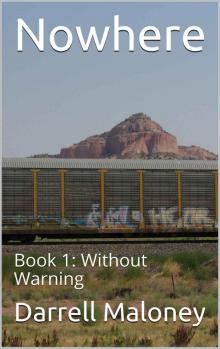 Without Warning
Without Warning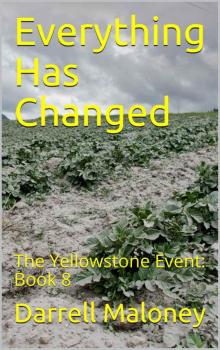 Everything Has Changed
Everything Has Changed Rest in Peace
Rest in Peace This Changes Everything
This Changes Everything The Final Chapter
The Final Chapter It Can't Be Her
It Can't Be Her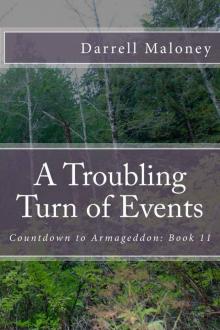 A Troubling Turn of Events
A Troubling Turn of Events The Blockade
The Blockade A Tearful Reunion
A Tearful Reunion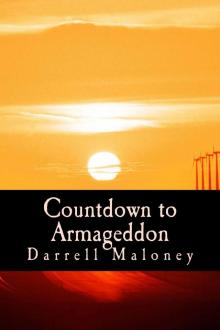 Countdown to Armageddon
Countdown to Armageddon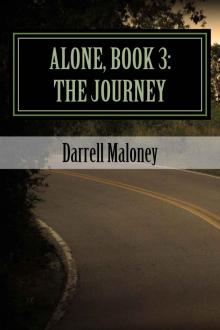 Alone, Book 3: The Journey
Alone, Book 3: The Journey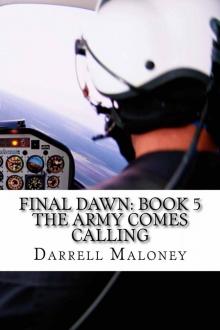 The Army Comes Calling
The Army Comes Calling The Grim Reaper Comes Calling
The Grim Reaper Comes Calling Her Name is Beth: Alone: Book 5
Her Name is Beth: Alone: Book 5 Red: The Adventure Begins
Red: The Adventure Begins Rise From The Ashes: The Rebirth of San Antonio (Countdown to Armageddon Book 3)
Rise From The Ashes: The Rebirth of San Antonio (Countdown to Armageddon Book 3) An Unkind Winter (Alone Book 2)
An Unkind Winter (Alone Book 2)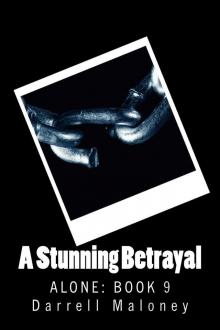 A Stunning Betrayal: Alone: Book 9
A Stunning Betrayal: Alone: Book 9 A Whole New World: Ranger: Book 2
A Whole New World: Ranger: Book 2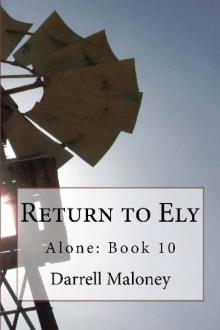 Return To Ely
Return To Ely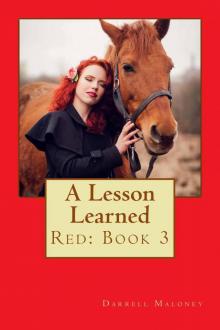 A Lesson Learned: Red: Book 3
A Lesson Learned: Red: Book 3 The Homecoming: Countdown to Armageddon: Book 5
The Homecoming: Countdown to Armageddon: Book 5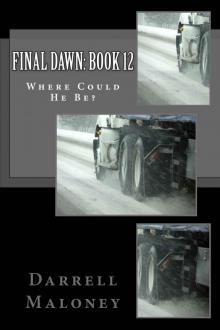 Final Dawn: Book 12: Where Could He Be?
Final Dawn: Book 12: Where Could He Be? An Acquired Taste
An Acquired Taste On Desert Sands: Alone: Book 6
On Desert Sands: Alone: Book 6 The Battle: Alone: Book 4
The Battle: Alone: Book 4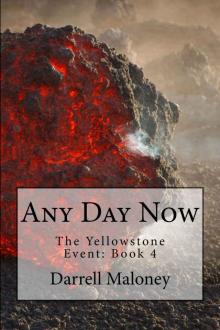 Any Day Now
Any Day Now Too Tough To Tame: Red: Book 2
Too Tough To Tame: Red: Book 2 No Help From Austin: Red: Book 5
No Help From Austin: Red: Book 5 An Unwelcome Homecoming
An Unwelcome Homecoming A New Start: Final Dawn: Book 9 (Volume 9)
A New Start: Final Dawn: Book 9 (Volume 9)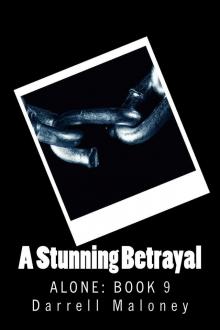 A Stunning Betrayal
A Stunning Betrayal An Undeclared War (Countdown to Armageddon Book 4)
An Undeclared War (Countdown to Armageddon Book 4)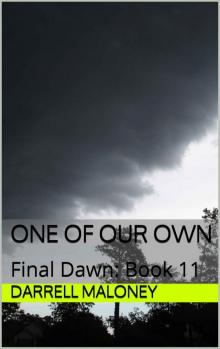 One of Our Own: Final Dawn: Book 11
One of Our Own: Final Dawn: Book 11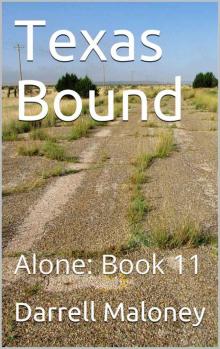 Texas Bound: Alone: Book 11
Texas Bound: Alone: Book 11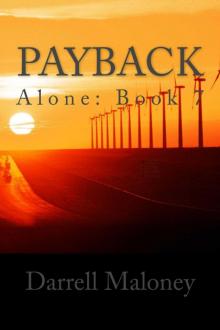 Payback: Alone: Book 7
Payback: Alone: Book 7 The Quest: Countdown to Armageddon: Book 6
The Quest: Countdown to Armageddon: Book 6 The Siege
The Siege The Yellowstone Event: Book 1: Fire in the Sky
The Yellowstone Event: Book 1: Fire in the Sky Return to Blanco (Red Book 4)
Return to Blanco (Red Book 4) The Search
The Search AFTER THE DUST SETTLED (Countdown to Armageddon Book 2)
AFTER THE DUST SETTLED (Countdown to Armageddon Book 2) Death Comes Calling (Ranger Book 3)
Death Comes Calling (Ranger Book 3)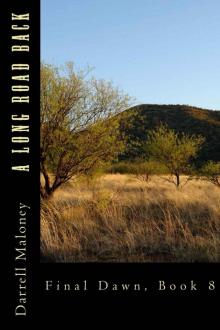 A Long Road Back: Final Dawn: Book 8
A Long Road Back: Final Dawn: Book 8